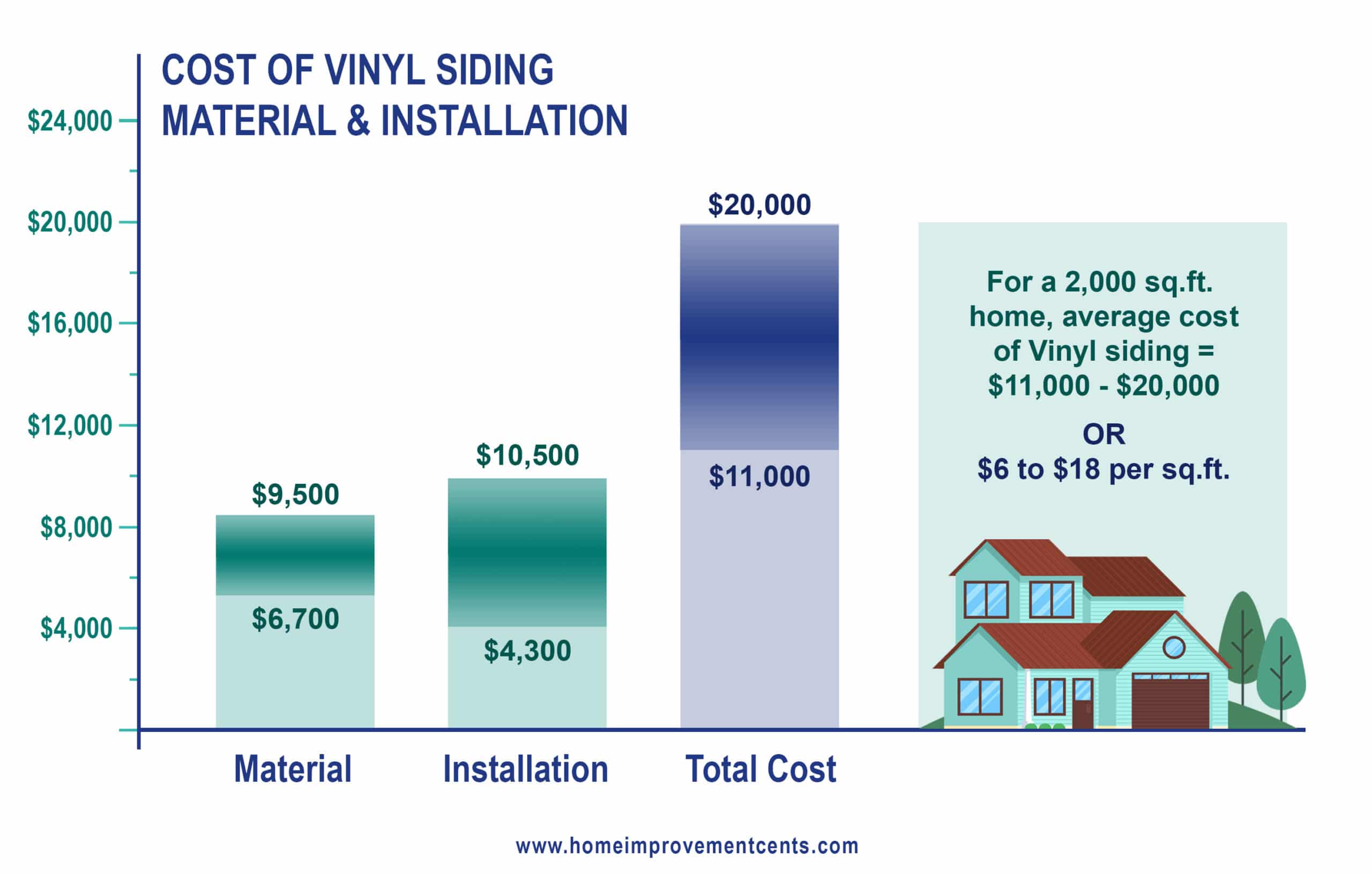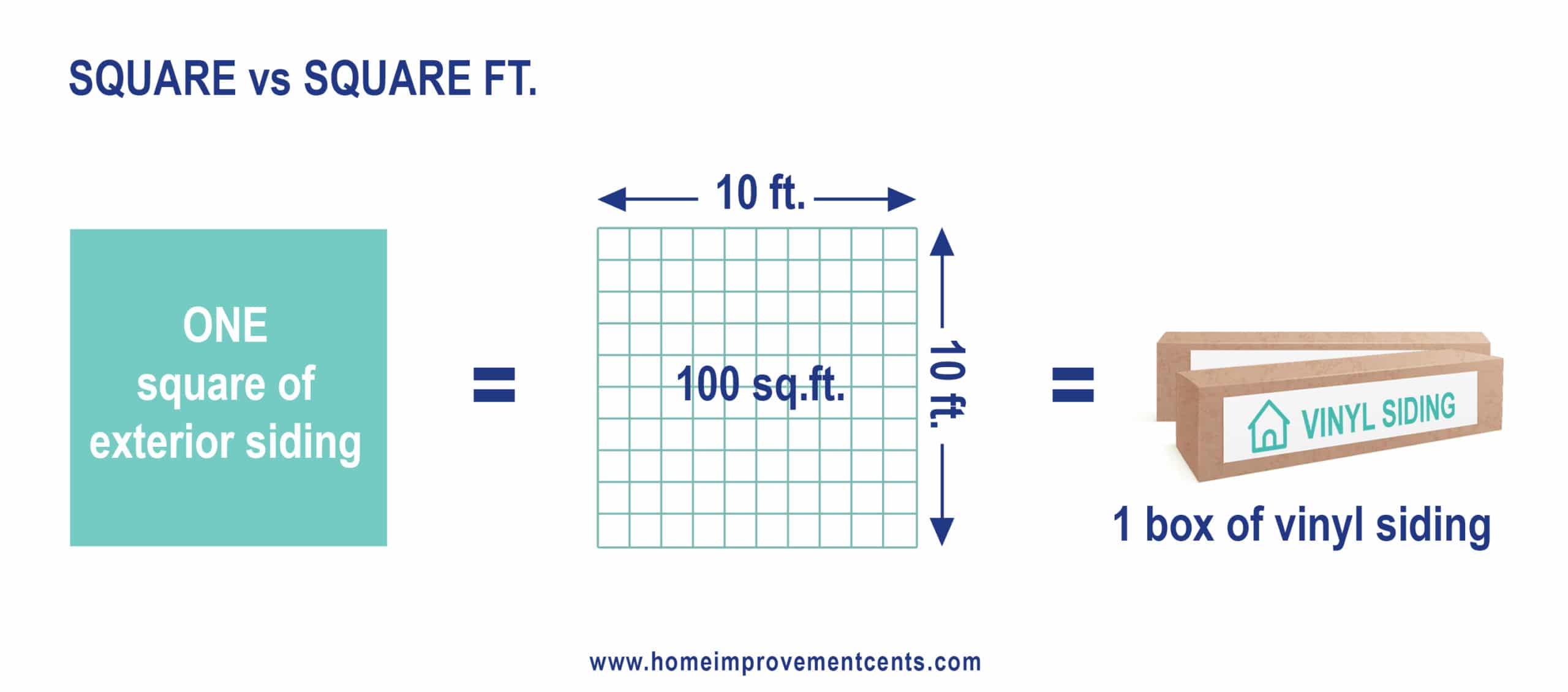Replace or Installing vinyl siding on your home can be necessity to maintaining a nice residence. Choosing vinyl for the siding on your home will save you money compared to choosing other siding materials, such as brick or cedar.
Vinyl siding for a 2,000 square foot home can cost between $11,000 and $20,000 on average. The cost ranges from $6 to $18 per square foot, depending on the quality of vinyl siding you choose when paying per square foot. These estimates include installation costs.
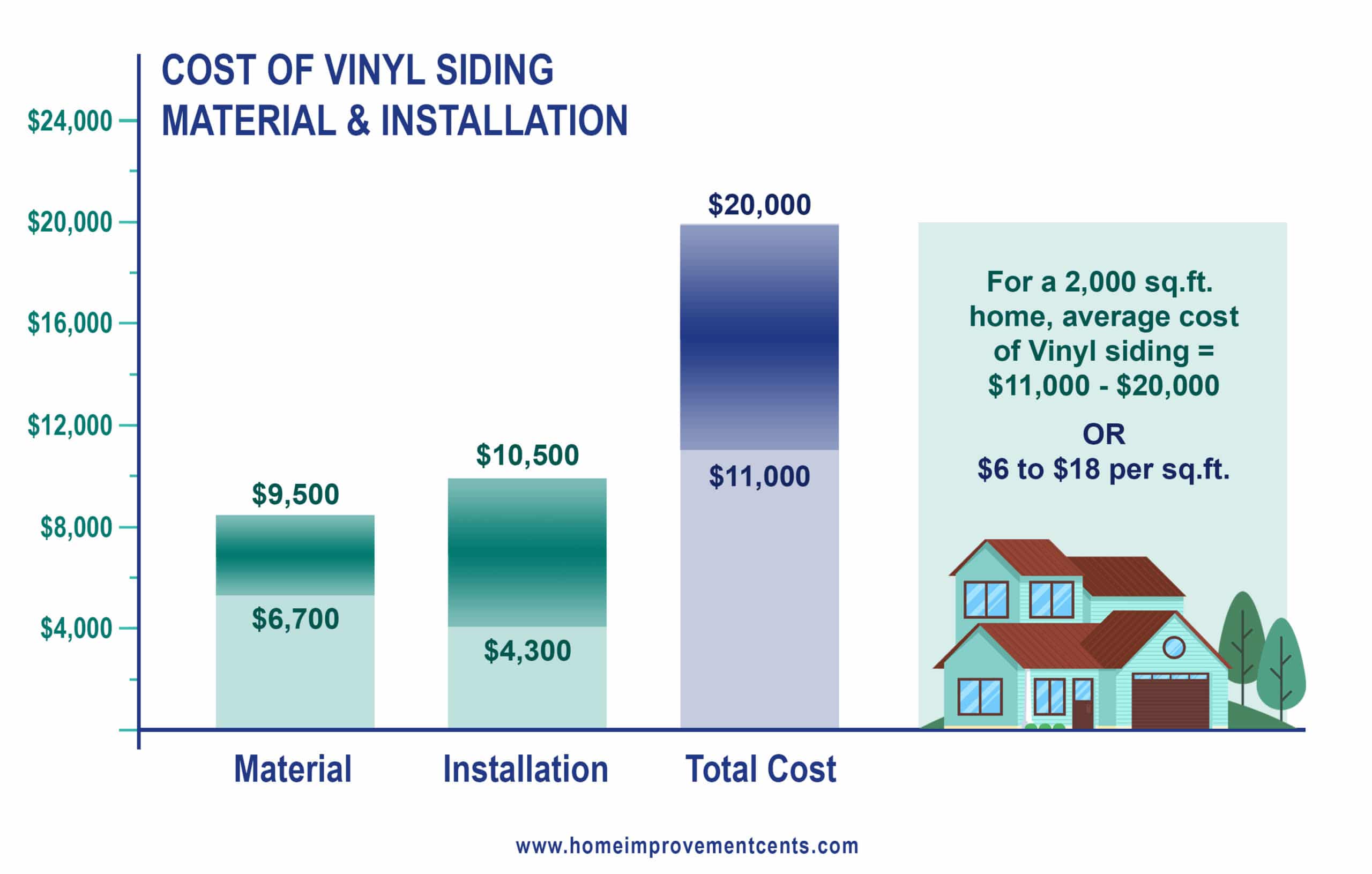
When deciding to use vinyl siding, you may be wanting to know an estimate of the cost of the materials and installation. When figuring out how much vinyl siding costs, you need to consider the installation fees and how much surface space you will be covering. Once you determine the factors involved with your project, you can determine the cost of vinyl siding for your home.
This consumer guide will provide a cost breakdown for vinyl siding. You will learn all the components that go into the cost of vinyl siding, along with tips for choosing vinyl siding and an installation company that is suitable to your needs. There are several types of siding you can choose for your home.
However, the inexpensive cost of vinyl siding and the low maintenance requirements make it an attractive option for homeowners needing new siding for their houses. After making the decision to install vinyl siding on your home, you will need to do some research to determine the quality of vinyl you desire, as this will affect the overall cost of your vinyl siding.
Read on to learn everything you need to know about vinyl siding costs.
Average Cost of Vinyl Siding
The average cost of a home inspection ranges from $11,000 to $20,000, according to the Homewyse Vinyl Siding Installation Calculator. These costs reflect the estimates given for a 2,000 square foot home and include installation and equipment fees.
The overall cost total can vary significantly based on the size of the house and the quality of vinyl chosen. Regions with higher living costs may have higher installation fees, leading to a higher overall cost.
Determining Vinyl Siding Needs
When beginning the process of purchasing vinyl siding, you will need to determine how much material you will need. Typically, vinyl siding is measured in squares. One square is the equivalent of 100 square feet of siding. Vinyl siding is commonly sold in boxes, with one box containing a full square or a half square of siding.
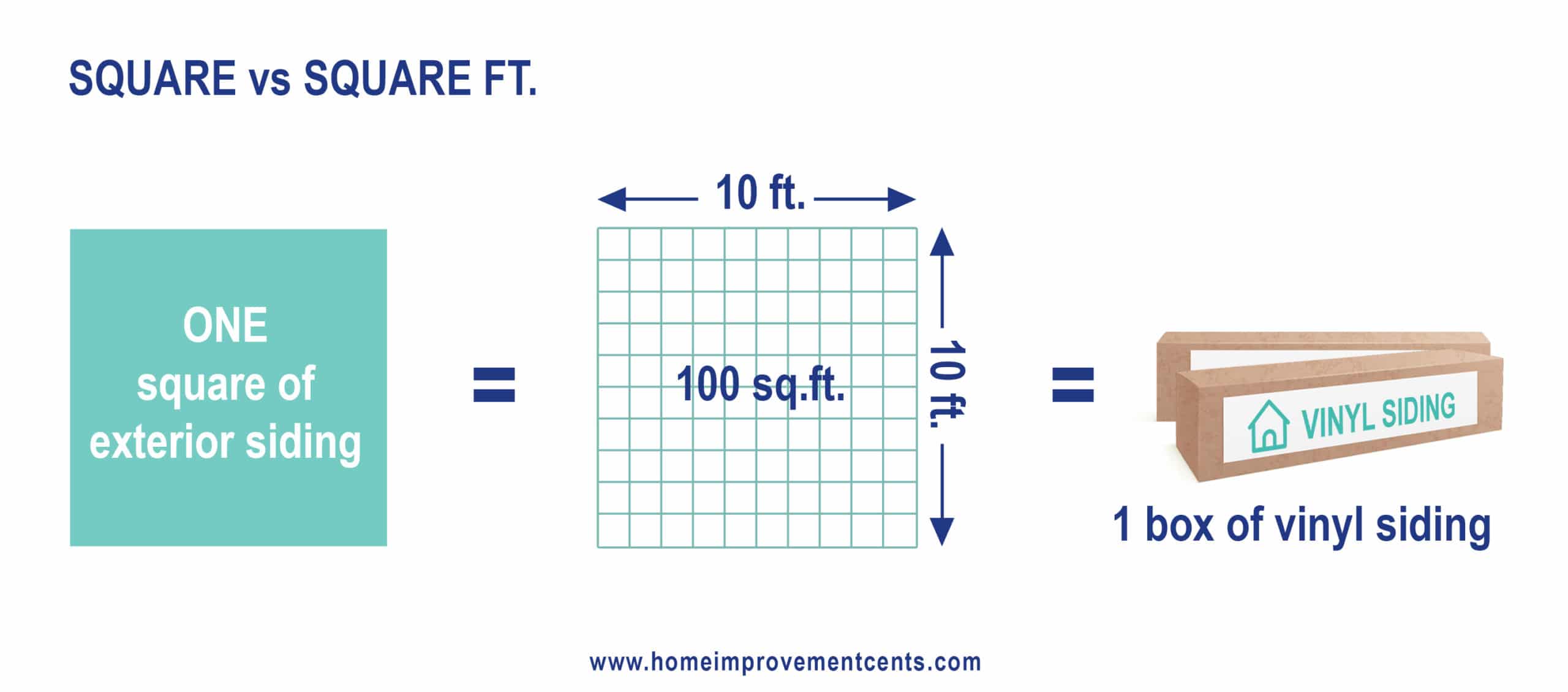
To determine how much vinyl siding you need; you will have to take measurements to figure out the square footage of the exterior of your house. This is possible on your own if you have a one-story house, but if you have a multi-level home, you may need a professional to come to evaluate the project.
Here are four easy steps to help you find out how much vinyl siding you will need:
As mentioned above, this process will be much more challenging to complete if you have a multi-level home. If you have a multi-level home, it is highly recommended that you hire a professional to evaluate the square footage of your home’s exterior. Attempting to complete this evaluation on your own could result in injury or death if you are attempting to reach very high places.
Once you know how many squares of vinyl siding your home requires, it will be easier to determine the cost of vinyl siding.
Installation Costs
The installation costs involved with vinyl siding play a significant role in the overall costs. On average, installation fees for vinyl siding range from $4,300 to $10,500. This cost is reflective of vinyl siding installation for a 2,000 square foot home. Labor costs take up a significant portion of the overall cost of vinyl siding. Additionally, companies will charge you for the installation equipment and job supplies costs. These costs can range from $900 to $1,000 for a 2,000 square foot home.
If you are having vinyl siding replaces, you will need to consider the costs of removing the previously existing siding. This cost can range from $800 to $1,900 for a 2,000 square foot home. Siding that is difficult to remove will increase your overall costs. The disposal costs of the vinyl siding debris will also play into your overall costs if you are unable to dispose of it on your own. These costs can range from $850 to $1,000, depending on how much debris you need to dispose of.
Typically, if you are having your siding replaced, the company will include the disposal costs in the removal. However, this is not the case with all installation companies, and you may want to inquire to find out how much extra the disposal can cost if it’s not included.
Vinyl Siding Material Costs
The material costs can significantly affect the overall cost of vinyl siding for your home. There is a wide variety of vinyl siding you can choose from, and some siding you come across will be more high-quality and pricier than other types.
Some vinyl siding patterns are larger than others and will cost more. You can choose smooth siding or textured siding with a variety of different colors and patterns. Some are made to look like rough-sawn wood, while others are boldly colored. With vinyl siding, the color is infused within each layer of the material, so you never have to worry about chipping or fading of the color. The higher price you pay for your vinyl siding, the more durable it will be.
Most vinyl siding is composed of polyvinyl chloride (PVC), which comes in dozens of different colors, and protects the home against ultraviolet rays. Vinyl siding panels should be a minimum of 0.04 inches thick. However, you can buy thicker panels for a higher price. Thicker panels are more durable and require less maintenance. You can also choose to purchase vinyl siding panels with extra weatherproofing. These panels are generally more expensive but will last much longer than vinyl siding panels without weather-resistant qualities.
Check the warranty on your vinyl siding panels before buying. Usually, panels with a more extended warranty are more trustworthy and likely to last. A short warranty length is a red flag and could mean the vinyl siding is not very durable.
Some of the most popular brands for vinyl siding panels are Certainteed, Georgia Pacific, and Norandex. Certainteed is well-known for using environmentally friend materials and providing maximum insulation. Georgia Pacific specializes in high-quality vinyl siding with a lifetime transferrable warranty. Norandex has the most weather-resistant vinyl siding on the market and also uses environmentally-friendly materials in their production.
Selecting a Vinyl Siding Contractor
Selecting a vinyl siding installation company can be tricky if you have a wide selection located in your region. Choosing a vinyl siding contractor that is not fit for the job could result in expensive repairs or overly priced services. Take time and care when selecting a vinyl siding installer to ensure you are satisfied with the costs and results.
In the process of choosing someone to install your vinyl siding, here are some factors that should be considered:
Here is a breakdown of some important elements to consider when selecting a home inspector:
Credentials
Many high-quality vinyl siding contractors are certified in what they do. When inquiring with different siding installation companies, ask whether or not they are Vinyl Siding Installer (VSI) certified. These certifications have different levels to help customers see how long the company has been certified.
A certified vinyl siding contractor is more likely to be able to install your vinyl siding properly than a contractor who is not certified. Although it is possible to find an installation contractor that is not certified and can complete the job correctly, it is safer to choose a company that is certified to guarantee your satisfaction with the results of the project.
Online Reviews
Be sure to check the online reviews before choosing a vinyl siding company to complete your project. Online reviews are a reliable method to figure out the quality of service a company offers. Use websites such as Google, Yelp, or Facebook to read a company’s reviews online. You can also check with the Better Business Bureau to determine if a company offers adequate services.
Most online reviews are written by customers who are overly satisfied or overly dissatisfied with the services or goods they received—because of this, looking at a company’s online reviews is a dependable method to find out the consistency and quality of services or goods a company has to offer.
Recommendations
When selecting a vinyl siding contractor, ask your friends, family, and colleagues for recommendations. Doing this can help you get honest opinions on the quality of goods and services a company has to offer. In comparison to online reviews, personal recommendations are less driven by emotions and are more likely to give you an accurate idea of the quality of service you will receive.
Before choosing a company to work with, asking your friends can help facilitate the decision you will be making. Word-of-mouth is one of the most significant ways a high-quality company gains traction. If people aren’t telling their friends and neighbors about a company they worked with, then it probably says something about the quality of goods and services the company delivers.
Examples of Previous Work
Most vinyl siding contractors will have a portfolio of photos displaying the past work they have completed. Looking at examples of a contractor’s previous work will help you get an idea about the quality they will deliver. You can see the results of the work they do, and if the company provides quality work, they should have a wide selection of previous work to look at.
If a vinyl siding installer is unable to produce examples of previous work for you to view, that could be a red flag. An experienced vinyl siding installer should be able to show you at least a few examples of high-quality completed siding projects. Be sure to look at examples from a variety of different vinyl siding companies. This can help you get a taste of what you should expect the final product to look like and gives you a better selection to choose from.
Cost
Different vinyl siding contractors might offer different prices. A more experienced and established contracting company will cost more to hire than a company that is just starting out. If you are on a tight budget, it’s okay to choose an inexpensive company to work with but be sure to check reviews and previous work examples to make sure you are not selecting a contractor who cannot complete the project correctly.
If you have a bigger budget to work with, hiring a vinyl siding contractor that charges higher installation fees could guarantee that you will be satisfied with the results. However, some installation companies tend to overcharge. Be sure to compare a high-quality company’s prices with local averages to ensure you are not being unnecessarily overcharged for the vinyl siding services.
Level of Experience
Working with a vinyl siding contractor with extensive experience can guarantee that the installation will be completed correctly. Although there are some inexperienced yet talented siding installers out there, it’s best to stay on the safe side and select a vinyl siding contractor who can pledge to complete the project properly.
Vinyl siding contractors who are Vinyl Siding Installation (VSI) certified are more likely to have more extensive experience than a contractor who is not VSI certified. The more experience a contractor has, the more comfortable they will be with the task at hand. If your home is multi-level or has nontraditional architecture, it may be wise to select a vinyl siding installer with more experience to ensure the project is finished accurately.
When choosing a vinyl siding installer, you should consider the elements listed above before making your decision. The contractor you choose to work with can have a significant impact on the results and longevity of your vinyl siding. Having your vinyl siding adequately installed can help you to avoid expensive repairs and replacements in the future. Be thoughtful when selecting a vinyl siding contractor to ensure you are satisfied with the results of the siding project.
Benefits of Vinyl Siding
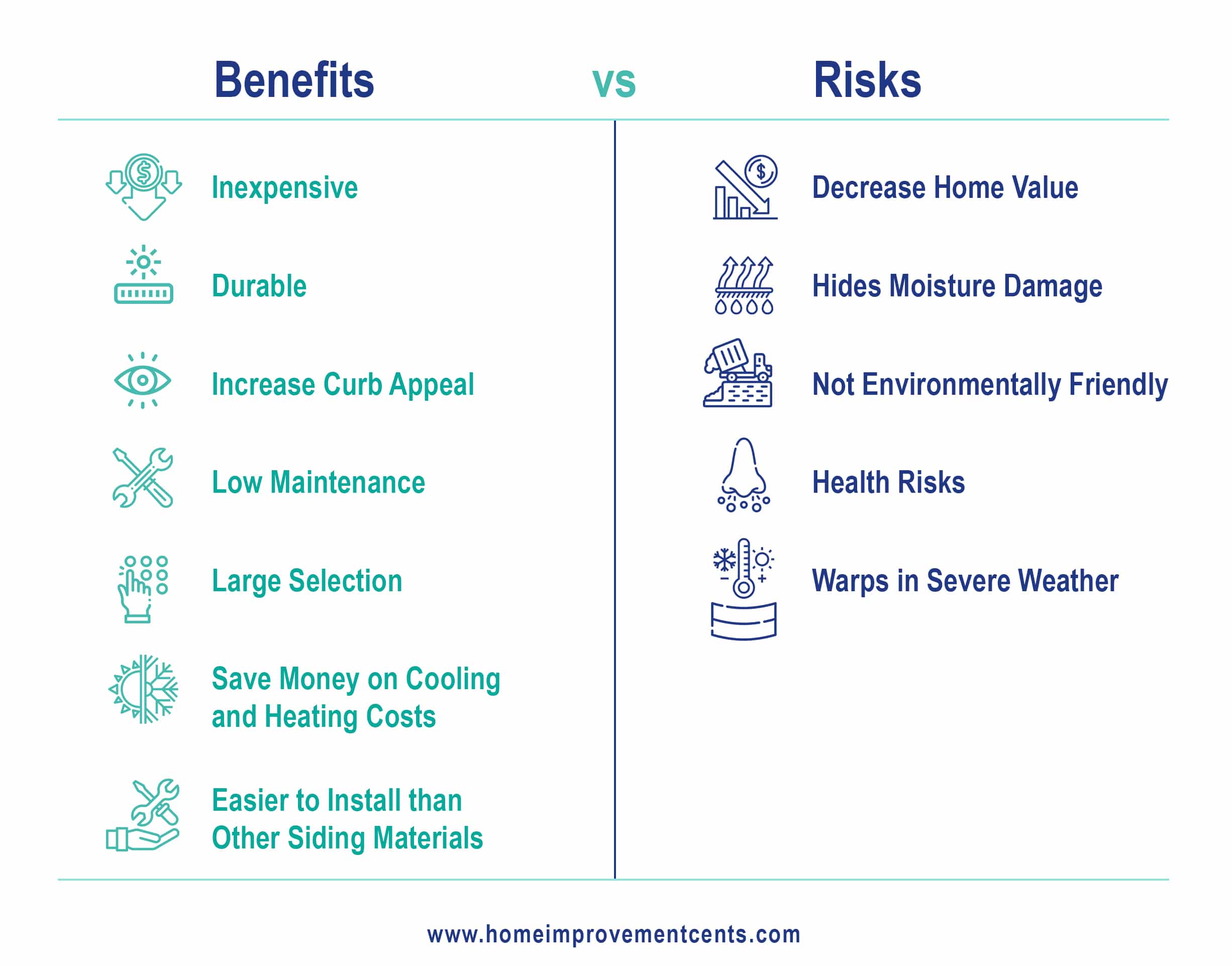
Using vinyl siding to wrap your home can come with many benefits. Consider the advantages involved in using vinyl siding before deciding which material to use to wrap your house. This wide variety of benefits that come with the installation of vinyl siding on a house make it an attractive option for homeowners needing to install or replace the siding on their house.
Here is a breakdown of some of the benefits involved with vinyl siding:
Risks of Vinyl Siding
There are a few risks you should consider when deciding to install vinyl siding on your house. Understanding these risks before moving forward with the installation of vinyl siding can help you to avoid unexpected disappointments down the line. The advantages of vinyl siding outweigh the disadvantages, but the risks are vital to know when deciding to wrap your house in vinyl siding.
Here is a breakdown of some of the risks involved with vinyl siding:
Frequently Asked Questions (FAQs)
After reading this consumer guide about the cost of vinyl siding, you may still have some questions on your mind about vinyl siding. Most homeowners don’t immediately face situations where they need to deal with siding when they first purchase their home, so it’s understandable if you are wanting to learn the ins and outs before beginning the process of installing vinyl siding on your house.
Here are the most frequently asked questions about vinyl siding:
Can I install vinyl siding myself?
Yes, it is possible to install vinyl siding yourself. However, if you are installing the vinyl siding on a multi-level home, the task could be risky if you are not accustomed to working in high places. It’s also important that installing vinyl siding on a house is tough work, which is why the labor costs are so high. You can save up to 50% on your overall costs by installing the vinyl siding yourself, but it is a lot easier to hire a vinyl siding contractor to complete the job.
How long does vinyl siding last?
Most vinyl siding installations will come with a warranty that ranges from 40 to 50 years. This is because the contracting companies who installed the siding expect it to last that long without excessive maintenance needs. Different types of vinyl siding will last different lengths of time. The most durable vinyl siding can last up to 100 years!
Can I paint vinyl siding?
Vinyl siding is generally designed in a way to minimize the need to paint it every so often. The color of vinyl siding runs throughout the material, so even if the siding chips or flakes, the color will remain solid. It is designed this way in order to lower the homeowner’s overall maintenance costs. However, if you are determined to paint your vinyl siding, it’s possible. The surface needs to be properly prepared before doing so, but if you take the correct measures when painting your vinyl siding, the paint job should look fine. (Related: YES You Can Paint Vinyl Siding: Here's How (A Step-By-Step Guide))
Is vinyl siding completely waterproof?
No, vinyl siding is not completely waterproof, contrary to popular belief. Most vinyl siding is constructed to be water-resistant or weatherproof, but there is no such thing as vinyl siding that is entirely waterproof. The way the panels are placed and overlapped during vinyl siding installation allows them to drain water from the siding easily. However, there is always a small chance of water getting in places it shouldn’t, which is why including foam backing behind the vinyl siding panels is highly recommended.
Does vinyl siding require maintenance?
Vinyl siding requires very little maintenance. The durable PVC materials that vinyl siding is composed of allow it to withstand weather and last a long time. Most properly installed vinyl siding will require no significant maintenance for the first 40 to 50 years. However, it is highly recommended that vinyl siding is washed at least once a year to preserve the color and prevent the buildup of dirt and grime. Washing the vinyl siding will keep the house looking nice and increase the curb appeal.
Can vinyl siding withstand strong winds?
For the most part, vinyl siding can withstand strong winds. Typically, properly installed vinyl siding with high-quality panels can withstand winds up to 110 miles per hour. If for any reason, the vinyl siding cannot survive strong wings, then the vinyl siding can be easily replaced. If you live in a region that has extreme weather or frequent high winds, there are some brands that make extra durable vinyl siding to survive intense storms.
Final Thoughts
Installing vinyl siding on the exterior of your home can allow you to save money on maintenance costs in the long run. Vinyl siding is inexpensive and low maintenance, making it an attractive option for homeowners who need to install siding on their house.
There are many advantages to choosing vinyl siding for your home. However, when making the decision to install vinyl siding on the exterior of your house, it’s essential to have an understanding of the costs involved with this project. Although the costs of vinyl siding installation are more affordable than other methods of siding, you must keep in mind that larger houses or houses located in regions with higher living costs will have higher overall costs for the vinyl siding project.
Choosing vinyl siding for your home can be a wise decision if you are wanting siding for your house that is affordable, durable, and low maintenance. Hopefully, this guide gave you the tools and information you need to move forward with arranging a vinyl siding project.


